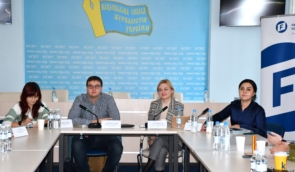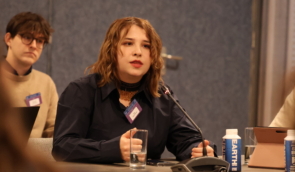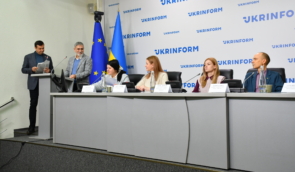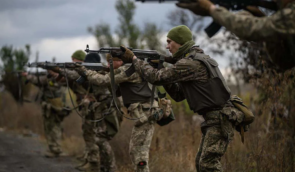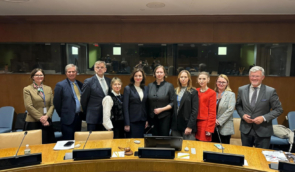Ukrainians in the occupation should receive vital services, but the legislation on collaboration does not take this into account – Onysiia Syniuk
On April 30, the results of the second wave of the all-Ukrainian survey “Reintegration and Social Cohesion” were presented in Kyiv, which examined the attitude of Ukrainians towards IDPs, people in the occupation and towards elections in de-occupied territories, etc.
 Onysiia Syniuk, a legal analyst at Human Rights Centre ZMINA
Onysiia Syniuk, a legal analyst at Human Rights Centre ZMINAThe survey was conducted by the Sociological Group “Rating” on the order of the “School of Political Analytics” NGO on March 11-16, 2024 in all regions, except temporarily occupied territories.
Thus, among other things, the vast majority of Ukrainians (69% in total) do not want to restrict the right to vote in presidential and parliamentary elections for residents of the territories occupied in 2014. And half of the respondents believe that it is worth limiting the right to run for parliament to those residents who lived in the territories occupied since 2014 for a certain period of time.
Also, more than 80% of Ukrainians are aware that the occupation regime itself poses a threat to all who live in the TOT. The study also showed that Ukrainians have a much better attitude towards IDPs than towards people who remained in the occupation, both after 2014 and after 2022. In particular, 13% of Ukrainians have a negative attitude towards fellow citizens who ended up in the occupied territory after February 24, 2022 and are still living there.
In addition to the presentation of the obtained data, the speakers of the event shared their interpretations of the opinions of the interviewed Ukrainians. In particular, Onysiia Syniuk, a legal analyst at Human Rights Centre ZMINA, reminded that the population does not have the opportunity to communicate directly with people in the occupation and find out how they live. Among other things, this affects the attitude of Ukrainians towards their fellow citizens in the occupation. Syniuk also adds that the interviewees would like to receive more information about everyday life in the occupied territory.
As the expert notes, Ukrainians in the occupation may fear that their life in the occupied territories may be perceived as support for the Russian regime.
“People in the occupied territories must continue to live and receive vital services. This is maintenance of electricity networks, sewers, streets, obtaining medical care, etc. And when we talk about workers who have to continue working in the occupation, we always emphasise that, unfortunately, our legislation on collaborative activities does not take these standards into account”, Syniuk says.

The expert also reminded that the state should individually approach each person who may be suspected of collaboration, because our citizens are constantly under threat – illegal detentions by Russians, enforced disappearances, torture, political cases, etc.
“We have to understand that in order to survive in the occupation, you need to get a passport. Now, when these territories were illegally included in the Russian Federation and the legal regime of Russia was extended to them, people cannot receive important services without this passport”, the expert noted.
You can watch the recording of the broadcast of the event here. Also, you can read more about the results of the study here.
This publication is supported by the Partnership Fund for a Resilient Ukraine, which is funded by the governments of Great Britain, Canada, the Netherlands, the United States of America, Finland, Switzerland and Sweden.
If you have found a spelling error, please, notify us by selecting that text and pressing Ctrl+Enter.

